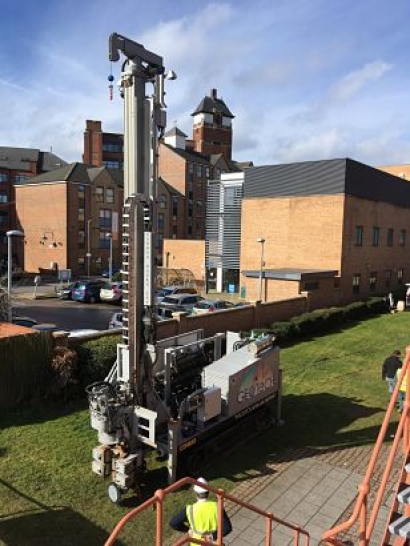
Academics at the university’s Institute of Energy and Sustainable Development are combining research and innovation as they study the feasibility of using geothermal energy to heat buildings. DMU is one of just four test sites across Europe selected to develop, demonstrate and monitor how to use heat energy stored in the ground.
Four boreholes have been drilled near the university’s Queen’s Building and heat exchangers installed to tap into underground heat. A novel type of heat pump will be used to raise the temperature of this heat and supply it to a university property on Grasmere Street. The project aims to show how the heat pump, which can switch between air and ground sources, can be a viable alternative to relying on gas as a fossil fuel.
DMU has been awarded nearly 142,000 euros to install and run the heat pump as part of a Horizon 2020 European Research Project, which is the biggest ever EU research and innovation programme. The other demonstration sites for the project called GEOTeCH are in Spain, Holland and Italy.
Geothermal heat pumps are a sustainable but under-exploited source of power. Professor Rick Greenough, Research Group Leader at the Institute of Energy and Sustainable Development, said he would like to see more homes and commercial buildings using nothing more than the internal heat contained in soil, rocks and fluids beneath the earth’s surface.
“Geothermal energy is the future – it’s a clean and sustainable source of power” said Professor Greenough. “It does not produce greenhouse gases that can be harmful to the atmosphere. We want to know more about how heat pumps perform to support their rapid use across Europe. Most people rely on gas but there is a limited supply of fossil fuels, whereas geothermal heat pumps can make use of the practically limitless heat from the sun that falls on the ground and warms the air around us. People wrongly think that these heat pumps are expensive and that you need a lot of space to install them, but that need not be the case.”
Innovative boring machinery was used to drill five boreholes at DMU in early March. An important part of the research involved finding suitable locations, where there was enough soft ground to drill down at least 10 metres using hollow augers instead of a conventional drill.
It took a couple of days to install heat exchangers into each of the boreholes. The fifth borehole is being used to locate temperature sensors, which will keep a record of vital data on the changes in ground temperature. The project will also collect data on energy consumption and comfort levels in the test site, which replicates a small domestic building.
The heat pump is expected to be in operation after the Easter break and data will continue to be collected until April, 2019.
This type of green energy technology is popular in Western America where geothermal power plants are more common. However, across Europe, the installation, operation and maintenance of the necessary equipment is thought to be more costly than traditional heating and cooling systems. The average cost to install a ground source heat pump depends largely on its efficiency and the borehole heat exchangers. More efficient heat exchangers mean that boreholes can be shallower, which reduces the cost of drilling.
The research aims to help project partners design and install more cost-effective heat pumps in the future. The research will also examine how the efficiency and benefits of geothermal energy have the potential to mitigate global warming and have a favourable impact on the environment.
Professor Greenough said they would be producing regular data reports to share with the European Commission and project partners, adding that the university will be incorporating the research into lectures and that a PhD student is helping with the project.
Image: A geothermal pump at DMU
For additional information:
De Montfort University Leicester (DMU) Institute of Energy and Sustainable Development

